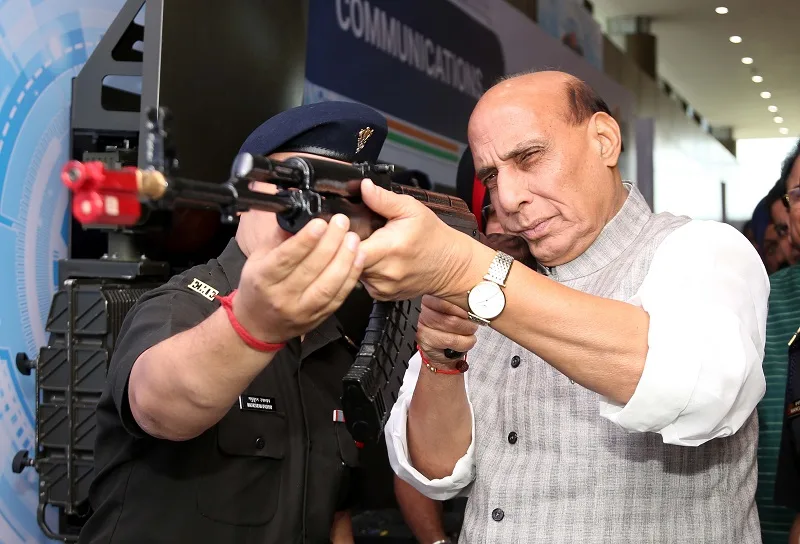

A file photo of Defence Minister Rajnath Singh at an exhibition organised on the sidelines of Army Commanders' Conference (Image courtesy: Ministry of Defence)
Defence Minister Rajnath Singh on Saturday once again stressed the need to develop indigenous state-of-the-art weapons and platforms that equip and prepare the Armed Forces to tackle new and emerging challenges.
In a veiled reference to China and Pakistan, the Defence Minister made it clear that self-reliance is not a luxury but necessity, to counter a double threat on the borders reinforced by infusion of technology in a fast-changing world.
Addressing a defence dialogue on ‘Aatmanirbhar Bharat’ in Lucknow, Singh said that the government, under the leadership of Prime Minister Narendra Modi, is ensuring that the Armed Forces are not dependent on foreign weapons and equipment. He said that the real strength lies in being ‘Aatmanirbhar’, especially when an emergency situation arises.
Citing the paradigm shift brought by technology in the nature of warfare, the Defence Minister termed a strong and self-reliant military as the backbone of a sovereign nation, which besides protecting the borders, safeguards the country’s civilisation and culture.
“Most of the weapons today are electronic-based systems, which can reveal sensitive information to the adversaries. As imported equipment has certain limitations, we need to go beyond the horizon and achieve self-reliance in niche technologies,” he mentioned.
“Latest weapons/equipment are equally important as the bravery of our soldiers. If India wishes to become a military power at the global level, there is no other option than being self-reliant in defence manufacturing,” Singh added.
Listing out the advantages of being ‘Aatmanirbhar’, the Defence Minister stated that it would not only decrease the expenditure on imports but also multi-dimensionally benefit the civil sector. He called for developing dual-use technology that, besides strengthening the defence sector, improves the standard of living of the people.
He also listed the steps taken by the government to create a robust defence ecosystem, which not only caters to domestic requirements but also fulfills the security needs of friendly countries.
These include setting up of Defence Industrial Corridors (DIC) in Uttar Pradesh and Tamil Nadu; earmarking of a record 75 per cent of the defence capital procurement budget (approximately Rs one lakh crore) for the domestic industry in 2023-24; 25 per cent R&D budget for private industry and Innovations for Defence Excellence (iDEX) initiative and Technology Development Fund to promote start-ups.
On the UP DIC, Singh said that the work is going on in mission mode and 95% of around 1,700 hectares of land has been acquired to date. Of these, 36 industries and institutions have been allotted nearly 600 hectares of land. 109 MoUs have been signed, with an estimated investment value of more than Rs 16,000 crore.
So far, a total investment of about Rs 2,500 crore has been made in UPDIC by various entities. The corridor will not only produce spare parts but also manufacture and assemble Drones/Unmanned Aerial Vehicles, Electronic warfare, Aircraft and BrahMos missiles.
Singh highlighted that the government’s efforts in the last few years have resulted in over Rs one lakh crore in defence production and nearly Rs 16,000 crore in exports in Financial Year 2022-23. He exuded confidence that the defence exports will soon cross Rs 20,000 crore mark.
“We are moving ahead at an unprecedented pace to achieve the Prime Minister’s vision of making India a developed nation by 2047. The aim is to build an economically powerful and completely self-reliant India, which is also a net defence exporter,” he said.
The Border Security Force (BSF) Director General Daljit Chawdhary on Friday met with Union Home…
By Shailesh Yadav Google Gemini, the generative artificial intelligence tool of technology major Google, can…
Union Home Minister Amit Shah spoke with Chief Ministers on Friday and asked them to…
Raja Abid, Chairman of the Revolutionary Students Organisation, has condemned the deteriorating education system in…
Tibetans-in-exile in Shimla observed the 36th birthday of the 11th Panchen Lama, Gendhun Choekyi Nyima,…
Leaders of the Baloch Yakjehti Committee (BYC), currently held in Huda Jail in Quetta, have…